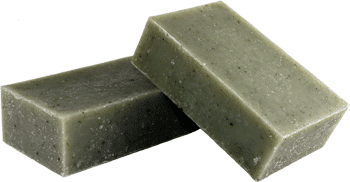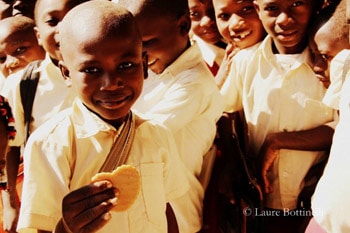I get, literally, about ten email pitches a day. Most of them go directly to the trash folder (and, to be honest, my spam folder), but the email I got from Erin Zaikis made me want to reach out.
Erin is the founder of a social enterprise and soap company, Sundara (www.livesundara.com). Her soaps are made here in NYC, and proceeds from their sales are being used to fund hygiene and water projects for children in underserved areas around the world. Sundara is currently operating projects in Haiti, India and Ghana – in schools, slums and community centers alike.
Children in Haiti at a Sundara handwashing class
Why soap? Because getting kids access to soap and teaching them how to wash their hands actually has a big impact on their life expectancy.
So I chatted with Erin and got her perspective on soap, handwashing, and the power of simple hygiene techniques.
Golda: What inspired you to start Sundara?
Erin: Last summer I was working in rural Thailand for an organization that combats child trafficking. As a part of my role there, I visited schools to meet children that were deemed at risk for being trafficked. In one school, I went to the restroom and when I came out to wash my hands, I realized there was no soap. I had my translator ask the students if they had any soap at the school or if they had ever washed their hands before and we just saw blank stares. I couldn’t believe that I was meeting children, some as old as 13, who had lived their whole lives without something I had been taking for granted every single day of mine.
So I drove to a store an hour away, bought out their supply of soap and conducted an impromptu hand washing workshop in the village. However many of the children just fumbled the bars of soap in their hands, not understanding what to do with them. It was mind blowing. I left that school thinking there was so much more to be done.
I started Sundara as my commitment to helping promote hygiene in underserved communities like these. Sundara is a soap company that raises funds for hygiene education and infrastructure – because I believe that basic hygiene is a right that everyone – no matter where they live – deserves to have. Since last year, we have been operating programs around the world in Haiti, Ghana and India.
Golda: Why is hand washing so important?
Erin: Diarrhea and pneumonia are the biggest killers of children in the developing world, taking the lives of almost 3.5 million children each year. However, as you hopefully know, diarrhea and pneumonia are PREVENTABLE illnesses. Hand washing is a low cost, low technology solution to preventing these childhood deaths – more effective and cheaper than any medicine or vaccine.
So much attention is given to clean water initiatives – and rightly so – but we are forgetting about the other side of the equation here. What good is clean water when a community lacks the hygiene education and a sustainable source of soap to use it with? Sundara seeks to bring attention to that part of the issue. We focus on sustainable, community led hygiene education initiatives in these areas and promoting localized soap recycling to make sure that even the neediest people will have access to soap regularly. Ultimately, if we can improve access to soap and educate about the benefits of regular hand washing, we can give these children a better chance to stay in school and reach adulthood, and therefore create healthier societies and a more equal world.
Golda: How does soap recycling work?
Erin: Our localized soap recycling with women’s cooperatives in each country creates the ultimate form of sustainability — by reducing waste in landfills, redistributing soap into the hands that need it most, improving hygiene amongst at-risk populations and ultimately reducing preventable hygiene related deaths.

Delightful Sundara soap
Our process takes the soap you use once or twice at a hotel and instead of letting it end up rotting away in a landfill, redistributes it to the people that need it the most. Partially-used soap is collected by hotel cleaning staff upon room checkout, then handed over to our employees and volunteers. We surface clean each bar of soap, grind it down into small pieces, and run it through a bleach solution to sanitize it. The soap is boiled and rebatched into new bars – and samples are tested for bacteria and pathogens at a third party lab to make sure that it will be impossible to transmit disease through the soap. Once we know the soap is up to our health standards it is distributed by local women’s cooperatives, free of charge, to schools, community centers and homes. These women serve as hygiene ambassadors and host regular health education workshops to empower their neighbors and children on preventative health measures.
Golda: Does use of soap have any negative impact on the water supply in developing countries?
Erin: None that I’m aware of at the moment.
Golda: Why is it important to use paraben/sulfate/detergent-free soap?
Erin: Your skin absorbs 60% of the things you put on it so make sure you treat it with the best products.
Here are some things to avoid in your soap:
Detergents: Soaps are made of materials found in nature whereas detergents are synthetic and petroleum based (they were developed during World War II when oils to make soap were scarce). Detergents are harsh on your skin. They strip away more natural oils than soap. Soap is better for the environment, as it is natural and biodegradable. Some detergents still contain phosphates which causes significant damage to the environment, especially fish and wildlife.
Sulfates: These are what makes soap foam, but they also strip your skin of its natural oils and are known to be contaminated with 1,4-dioxane, a probable human carcinogen according to the EPA.
Fragrances: Any ingredient list that contains the word “fragrance”—and most do—is likely to contain a host of possibly dangerous chemicals, including endocrine disruptors like phthalates. This category is especially scary because it’s been shown to cause problems to the hormone system in very small amounts.
Parabens: This common preservative is also known to mess with hormones by acting as an estrogen mimicker.
Alcohol: This ingredient is extremely dehydrating, sucking the natural oils out of your skin and causing our faces to age faster.
Golda: Where can people buy your soap?
Erin: Our soap is available for purchase online at www.livesundara.com.
Golda: What percentage of profits go to Sundara’s soap initiatives?
Erin: $1 from each soap is donated to our hygiene fund – which is currently running projects in Ghana, Haiti and India. Thus, when you wash your hands with a bar of Sundara soap, you are providing the gift of health to communities around the world.
Golda: What can people do if they want to help/get involved with this work?
Erin: One of the biggest ways to help is through purchasing soap to fund our efforts – they make great thank you and house warming gifts as well as party favors!
If you’re interested in helping with your time we also have many opportunities. We are starting Sundara chapters in colleges across the country to fundraise for soap recycling initiatives. We are also looking to connect with people in the hospitality industry to expand our efforts and impact as many communities as possible. Additionally, we are still looking for part-time summer interns. If you’re interested in connecting or talking about any of these opportunities, please email erin@livesundara.com.
